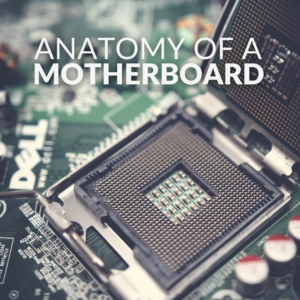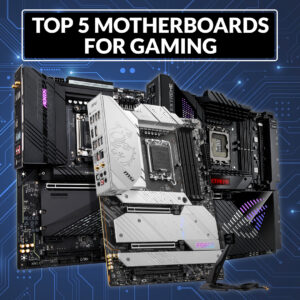When it comes to gaming performance, your first thought might be to splash all your cash on the graphics card and processor, but that can be a costly mistake. In this article, we’re looking at whether your motherboard affects gaming performance.

Is the Motherboard Really That Important?
Think of the motherboard as the unsung hero of your gaming setup. Not only is your motherboard the backbone to which everything else connects, but it also handles how your CPU, GPU, RAM, and other components talk to each other. A poor-quality motherboard can limit your system’s potential, leading to bottlenecks and performance drops. There are a few key components to look for when choosing a good motherboard.
VRM Cooling
Voltage Regulation Modules (VRMs) are one of the biggest factors that can affect performance, especially if you’re overclocking. Put simply, your motherboard’s VRM handles power delivery, ensuring components get what they need without overheating. Motherboards with high-quality VRMs will have better power delivery, allowing for more stable performance under heavy loads.

For higher-performance processors and overclocking, you’ll need a motherboard with good VRM cooling. Generally, this will usually look like a large lump to the left and above the CPU. Some even include fans or advanced heat-pipe designs, ensuring your CPU isn’t held back by thermal throttling when you push it to its limits.
Expansion and Future-Proofing
If you’re serious about future-proofing your gaming PC, PCIe 5.0 is a major leap forward. This latest version of PCIe doubles the bandwidth of its predecessor, offering 32 GT/s per lane. For your GPU, this means faster data transfer, helping to push higher frame rates and smoother visuals, especially in demanding titles. Admittedly, GPUs aren’t fully ready to take advantage of PCIe 5.0 just yet, but you’ll certainly see benefits should you upgrade your graphics down the road.
NVMe SSDs are about to get a massive speed boost as well. While PCIe 4.0 SSDs already provide blistering fast read and write speeds, PCIe 5.0 SSDs could potentially hit up to 14,000 MB/s, cutting down game load times and file transfers even further.

Do I Actually Need a High-End Motherboard?
The answer depends on your setup and goals. If you’re running a flagship CPU or planning to overclock, then yes, investing in a high-end motherboard makes sense. Premium motherboards come with better VRM cooling, higher-quality components, and additional features that help keep your CPU stable when pushed to the limit. You’ll also likely get more PCIe lanes, faster memory support, and better connectivity options like PCIe 5.0 and Thunderbolt.

However, if you’re rocking a mid-range CPU and aren’t interested in overclocking, you can absolutely get by with a more basic motherboard. These still offer plenty of features for gaming and general use, without breaking the bank.
TL;DR
So, do motherboards actually affect gaming performance, or can you pair that top-of-the-line CPU with a bargain-bin motherboard? Yes, absolutely, of course they do! A high-quality motherboard not only maximises the potential of your CPU and GPU but also ensures a stable and enjoyable gaming experience. By investing in a board with effective VRM cooling, high-quality capacitors, and robust overall build quality, you’re setting the stage for gaming success.
But of course, everyone has different needs – so we’ve put together this quick table with recommended chipsets for various uses.
| Use | AMD Chipset | Intel Chipset |
|---|---|---|
| Casual Gaming | AM4 B550 / M AM5 B650 / E | LGA 1700 B660 / B670 |
| AAA Gaming | AM5 X870 / E | LGA 1700 Z690 / Z790 LGA 1851 Z890 |
| Creative Work | Threadripper sTR5 Threadripper WRX8 | LGA4677 W790 |
Ready to Upgrade Your Motherboard?
Whether you’re after top-tier performance for overclocking or just need a reliable option for your mid-range build Overclockers UK has your back!
Asus TUF Gaming B650-Plus WIFI (Socket AM5) DDR5 ATX Motherboard

Asus ROG Strix B760-F Gaming WIFI (LGA 1700) DDR5 ATX Motherboard

Confused About Other PC Hardware?
Hey, don’t worry, we’ve all got to start somewhere; while PC gaming is a lot less complicated than it might first seem, there is still a boatload to learn. Check out more content on the OcUK blog.




Would be useful for shoppers, if you put together a recommended table of motherboards based on budget or use case.
That is a great suggestion – we’ll get that drafted up and added 🙂